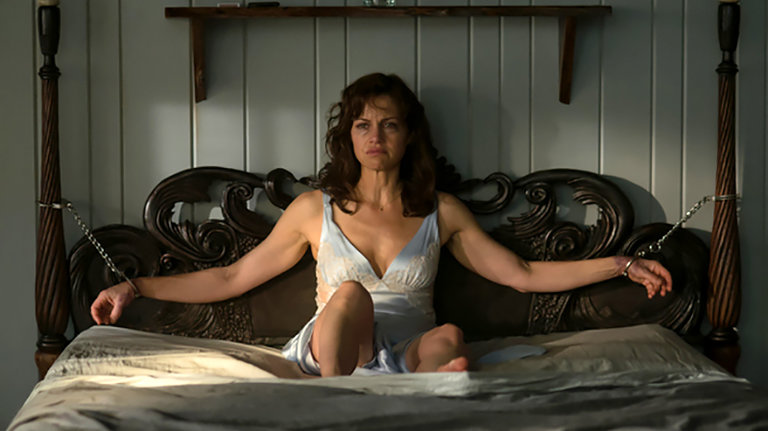Insular and oppressive, Gerald’s Game, torments the viewer and its female protagonist as Zoe Louca explores the ’emotional depth’ in this horror film.
Following the huge success of the adaptation of Stephen King’s It, which is now the highest grossing horror film of all time, comes the less-anticipated film Gerald’s Game which has recently been released onto Netflix. Despite the little publicity, this new adaptation is just as deserving of high praise, offering audiences a chilling new psychological horror/thriller.
This films tells the story of a married couple Jessie (Carla Gugino) and Gerald (Bruce Greenwood) who take a trip to a secluded house in the countryside with the hopes of spicing up their love life. A kinky roleplay game ensues as Jessie is handcuffed to the bed with an excited Gerald popping a Viagra for good measure. However, things take a turn as the couple begin to argue – tempers flare along with Gerald’s heart-rate causing him to have a heart attack leaving him collapsed dead on his handcuffed and helpless wife. The rest of the film follows Jessie’s struggle to break free from the bed whilst in the midst of a mental breakdown as trauma from her childhood begins to resurface.
This film explores the ways in which women can be abused, from explicitly as a child to a more subtle domestic abuse.
Director Mike Flanagan (also known for horrors Oculus, Hush and Ouija) successfully creates a Hitchcockian feel to this horror/thriller with an abundance of tension and suspense. Audiences are kept on edge as the film becomes increasingly unnerving with Jessie becoming more and more unhinged, faced with the growing possibility of starvation. Tension mounts as a stray dog wonders into the house sniffing at the dead body of Jessie’s husband, serving as a constant reminder of what could become of her if she doesn’t escape the handcuffs.
The majority of King’s novel is set in one room with few characters which would presumably be tedious on screen – yet Flanagan manages to make good use of these restrictions with the single room creating a claustrophobic feel adding to the sense of unease. Flanagan utilises the small cast by representing the different voices in Jessie’s head with a smug Gerald and a strong-willed Jessie, showing her inner conflict and broken psyche.
This film explores the ways in which women can be abused, from explicitly as a child to a more subtle domestic abuse. Jessie’s entrapment from the handcuffs serves as a mirror for the relationships with the men in her life, much like Gerald’s disturbing interest in bondage mirrors Jessie’s childhood abuse from her father. This makes the film’s ending even more inspiring as when Jessie breaks free from the handcuffs she also breaks free from the abuse of her father and husband.
Gerald’s Game is a story of a woman’s struggle against the control of men, with brilliantly compelling performances, particularly from Carla Gugino. Horror fans will be satisfied by the healthy dose of gore and violence, yet surprised by the emotional depth formed from the flashbacks of childhood abuse. This film will leave you haunted yet uplifted – definitely worth a watch!
Zoe Louca
(Image courtesy of Book Bub)

